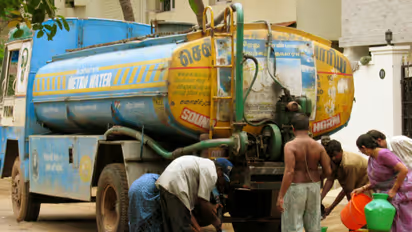
Chennai: Several parts of Chennai city in Tamil Nadu face acute water shortage and trying to make use of this opportunity are water tankers that have hiked the price by two times.
Many have even started considering daily bath a luxury and finding adequate water for doing laundry and dishwashing has become a nightmare.
A central Chennai resident Kumar B Das said he is spending around Rs 2,500 on water tankers per month, apart from the money that goes for purchasing bottled drinking water.
"I have started reusing utensils by wiping them with a cloth or tissue after first use. That saves much water. Body sprays have become dear to me," the IT professional said.
Raveendranath, a member of a residential association said they had to depend on private tankers for supply as the government metro water tankers take 2 to 3 weeks to turn up. Private operators have hiked the rates and are demanding Rs 3,000 to 5,000 per truck load of water, he claimed.
A deficit rainfall during the 2017 northeast monsoon and failed monsoon in 2018 has resulted in depletion of ground water and near drying-up of major water bodies, and has pushed residents at the mercy of water-tanker operators.
Amid the shortage, chief minister K Palaniswami, deputy chief minister O Panneerselvam, ministers and officials took part in a meeting on Wednesday to review water supply. Officials, however, declined to divulge what transpired at the meeting.
Residents and activists allege that the efforts of the state government in water conservation have proven to be a damp squib.
A senior official in Chennai Metropolitan Water Supply and Sewerage Board (CMWSSB) that supplies water to the city told PTI that compared to other metropolitan cities Chennai is in a disadvantaged location because of lack of any perennial rivers.
"We are doing our best and focusing on water distribution, supply and finding alternative sources to meet the growing demand of Chennai. We plan to set up two desalination plants - capacity of 150 million litres of water per day (mld) and 400 mld - is in the pipeline," the official said.
Presently, the city has two desalination plants with a capacity of 100 mld each.
Meghala, a maid and a resident of a slum in south Chennai, said the state of those in the low-income groups is distressing.
"My income is around Rs 6,000 a month. The water I require every other day is 20 pots, each costing Rs 10. Easily Rs 3,000 is gone for a month," Meghala said.
Early this year, 24 districts, including Chennai, were declared drought-affected by the state government. CMWSSB has around 900 water tankers, each taking 10 trips, to supply water to the city.
As on May 29, the combined water storage in four major lakes of Chembarambakkam, Poondi, Redhills and Sholavaram that supply water to the city is 76 million cubic feet as against 2,964 mcft last year, according to the CMWSSB. The per day supply to Chennai is 525 mld (both through pipes and tankers), a number reduced from 800 mld, the official said.
Calling the crisis human-induced, Jayaram Venkatesan, convener of Arappor Iyakkam, a city-based NGO fighting against corruption, said this would not have been the situation if at least 20 water bodies were maintained properly.
"These water bodies are not desilted, garbage is thrown, construction waste is dumped, sewage is let in, encroachments are another big issue," Venkatesan said.
Proper maintenance would help in groundwater recharge as well as water-storage capacity during rains, he said.
Chennai and its neighbouring Kanchipuram and Thiruvallur districts have over 3,000 large and small water bodies.